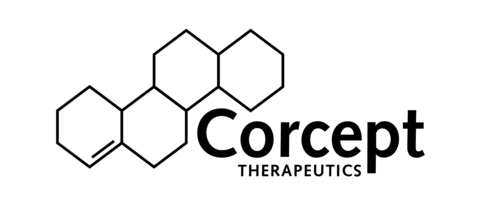Corcept’s Phase 3 Long-Term Extension Study of Relacorilant Demonstrated Durable Cardiometabolic Improvements in Patients with Hypercortisolism
Corcept’s Phase 3 Long-Term Extension Study of Relacorilant Demonstrated Durable Cardiometabolic Improvements in Patients with Hypercortisolism
- Results from Phase 3 long-term extension study of relacorilant to treat patients with hypercortisolism were presented at the World Congress on Insulin Resistance, Diabetes & Cardiovascular Disease (WCIRDC)
- 116 patients with hypercortisolism were enrolled with treatment duration of up to six years
- Results provide further evidence of relacorilant’s potential benefit as a treatment for patients with hypercortisolism
REDWOOD CITY, Calif.--(BUSINESS WIRE)--Corcept Therapeutics Incorporated (NASDAQ: CORT), a commercial-stage company engaged in the discovery and development of medications to treat severe endocrinologic, oncologic, metabolic and neurologic disorders by modulating the effects of the hormone cortisol, presented results from its Phase 3 long-term, open-label extension study of relacorilant to treat patients with endogenous hypercortisolism (Cushing’s syndrome) at the WCIRDC. The results from this study demonstrated that patients treated with relacorilant experienced clinically meaningful and durable cardiometabolic improvements and relacorilant was well-tolerated, with a treatment duration of up to six years.
The Phase 3 long-term extension study enrolled 116 patients who had previously completed either Corcept’s Phase 3 GRACE or GRADIENT studies or its Phase 2 study in hypercortisolism. Patients experienced further improvement in blood pressure while maintaining response in other cardiometabolic measures, such as glycemic control and body weight. Consistent with its known safety profile, relacorilant was well-tolerated with a treatment duration of up to six years.
At month 24 of the study, patients exhibited clinically meaningful and statistically significant reductions in mean systolic blood pressure (10.0 mm Hg; p-value: 0.012) and mean diastolic blood pressure (7.3 mm Hg; p-value: 0.016), compared to their measurement at entry into the long-term extension study. Patients who resumed receiving relacorilant in the extension study, after being switched to placebo in the randomized-withdrawal phase of the GRACE study, experienced both a reversal of the deterioration they exhibited while receiving placebo and additional improvement beyond their blood pressure measurement at entry into the randomized portion of the study. To ensure accuracy, blood pressure was measured by 24-hour ambulatory blood pressure monitoring.
Dr. Richard Auchus, MD, PhD, Professor of Internal Medicine in the Division of Metabolism, Endocrinology & Diabetes at the University of Michigan and Chief of the Endocrinology & Metabolism Section at the Ann Arbor VA Medical Center, presented the long-term extension results at WCIRDC.
“People living with hypercortisolism are at risk of serious cardiometabolic comorbidities, including hypertension and hyperglycemia. These long-term data demonstrate significant improvements across a broad set of signs and symptoms of hypercortisolism without the toxicities observed with current treatment options. It is especially encouraging to see data from patients treated for up to six years that show progressive reductions in blood pressure, maintenance of cardiometabolic improvements, and long-term drug tolerability,” said Dr. Auchus.
“The positive results from the long-term extension study of relacorilant are consistent with findings from our GRACE, GRADIENT and Phase 2 studies. These data will support relacorilant’s new drug application (NDA), which we plan to submit this month,” said Bill Guyer, PharmD, Corcept’s Chief Development Officer. “Relacorilant’s strong efficacy and safety profile positions the medication to become a new standard of care in treating patients with hypercortisolism.”
The presentation at WCIRDC is available here.
About Relacorilant
Relacorilant is a selective cortisol modulator that binds to the glucocorticoid receptor but not to the body's other hormone receptors. Corcept is studying relacorilant in a variety of serious disorders in addition to endogenous hypercortisolism (Cushing’s syndrome), including ovarian, adrenal and prostate cancer. Relacorilant is proprietary to Corcept and is protected by composition of matter, method of use and other patents. Relacorilant has orphan drug designation in the United States and the European Union for the treatment of Cushing’s syndrome.
About Hypercortisolism (Cushing’s Syndrome)
Hypercortisolism is caused by excessive activity of the hormone cortisol. Symptoms vary, but most patients experience one or more of the following manifestations: hypertension, central obesity, elevated blood sugar and difficult-to-control type 2 diabetes, severe fatigue and weak muscles. Irritability, anxiety, depression and cognitive disturbances are common. Hypercortisolism can affect every organ system and can be lethal if not treated effectively.
About Corcept Therapeutics
For over 25 years, Corcept’s focus on cortisol modulation and its potential to treat patients with a wide variety of serious disorders has led to the discovery of more than 1,000 proprietary selective cortisol modulators. Corcept is conducting advanced clinical trials in patients with hypercortisolism, solid tumors, ALS and liver disease. In February 2012, the company introduced Korlym®, the first medication approved by the U.S. Food and Drug Administration for the treatment of patients with endogenous hypercortisolism. Corcept is headquartered in Redwood City, California. For more information, visit Corcept.com.
Forward-Looking Statements
Statements in this press release, other than statements of historical fact, are forward-looking statements based on our current plans and expectations and are subject to risks and uncertainties that might cause our actual results to differ materially from those such statements express or imply. These risks and uncertainties are set forth in our SEC filings, which are available at our website and the SEC’s website.
In this press release, forward-looking statements include statements concerning: relacorilant, including its clinical attributes and potential to receive regulatory approval and become a standard-of-care treatment for patients with endogenous hypercortisolism or any other disorder; regulatory oversight of relacorilant and the scope, pace and outcome of its NDA submission; relacorilant’s acceptance and use by physicians and patients and its commercial prospects; and the scope and protective power of relacorilant’s orphan drug designation and our intellectual property. We disclaim any intention or duty to update forward-looking statements made in this press release.
Contacts
Investor inquiries:
ir@corcept.com
Media inquiries:
communications@corcept.com
www.corcept.com
